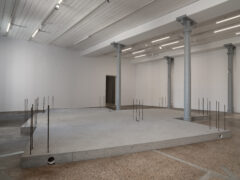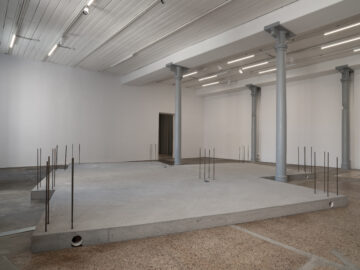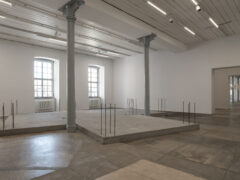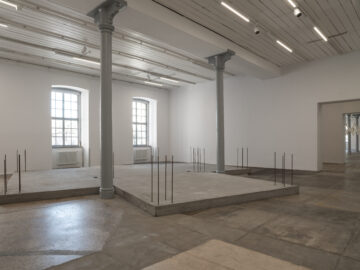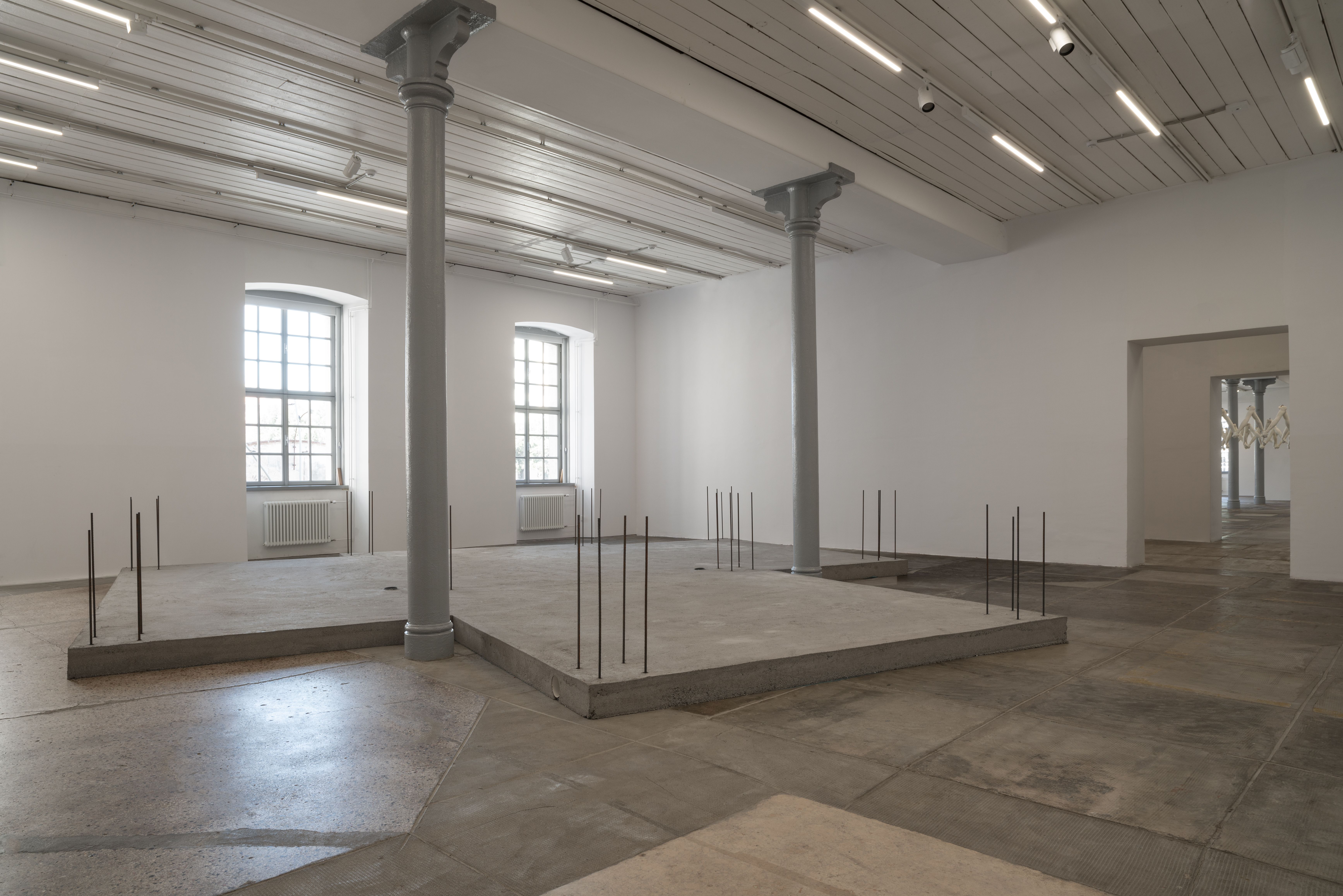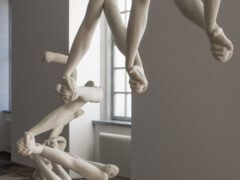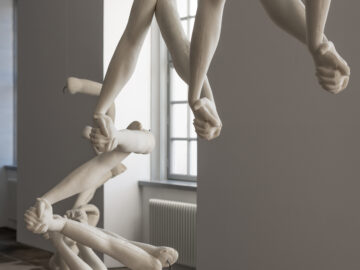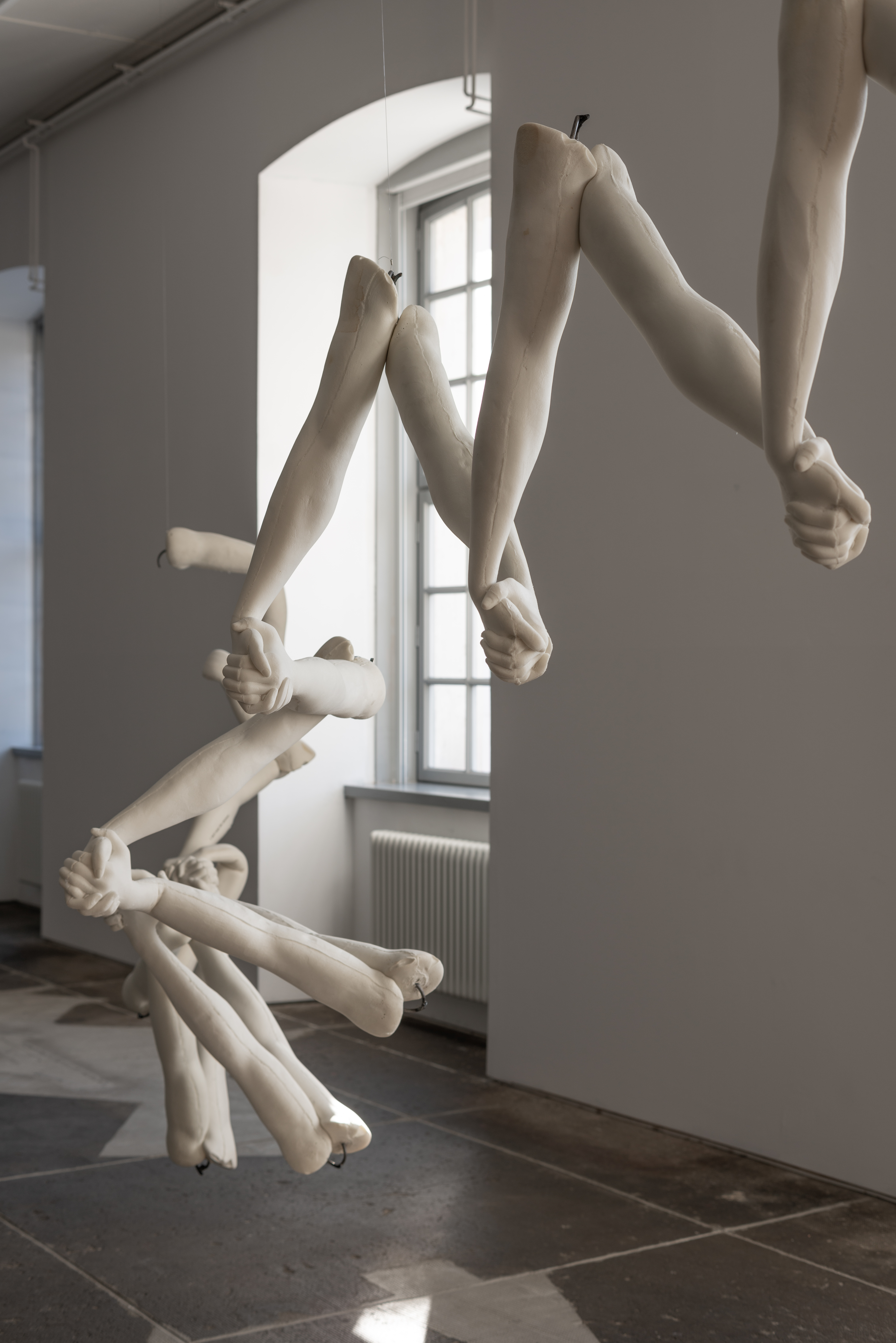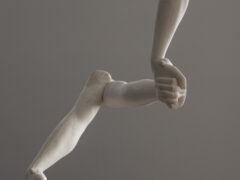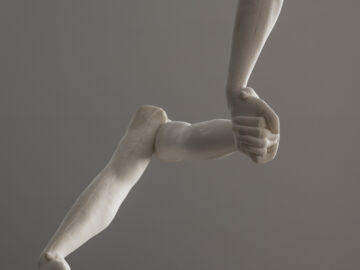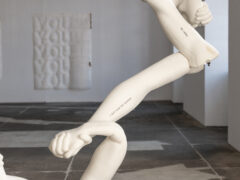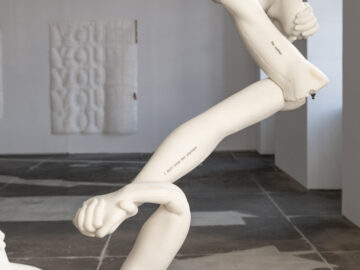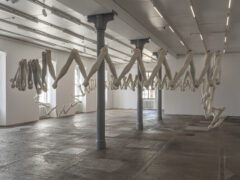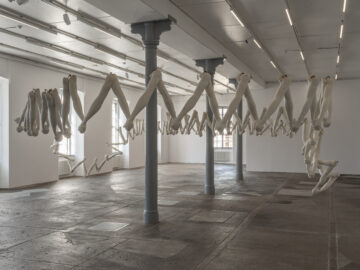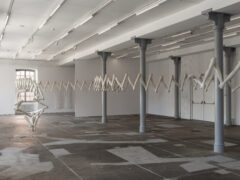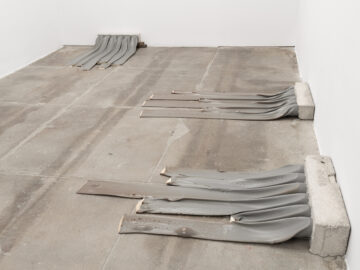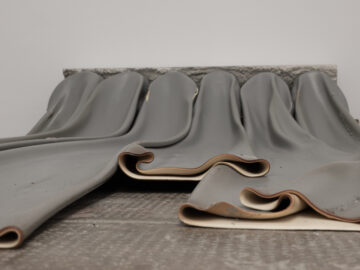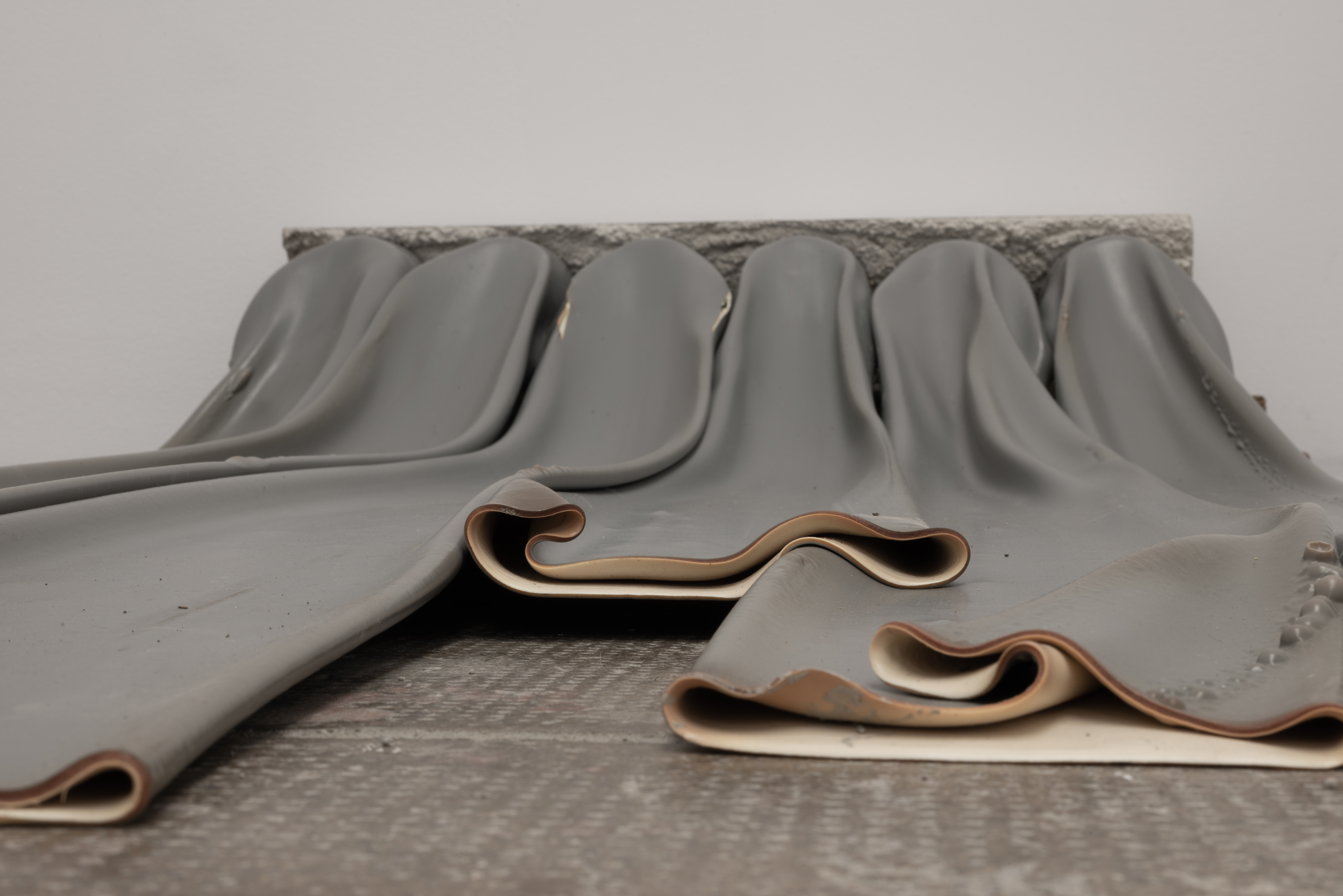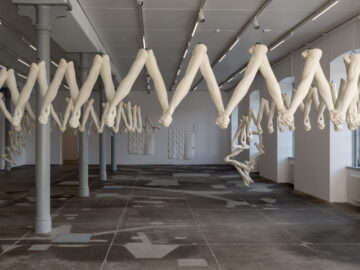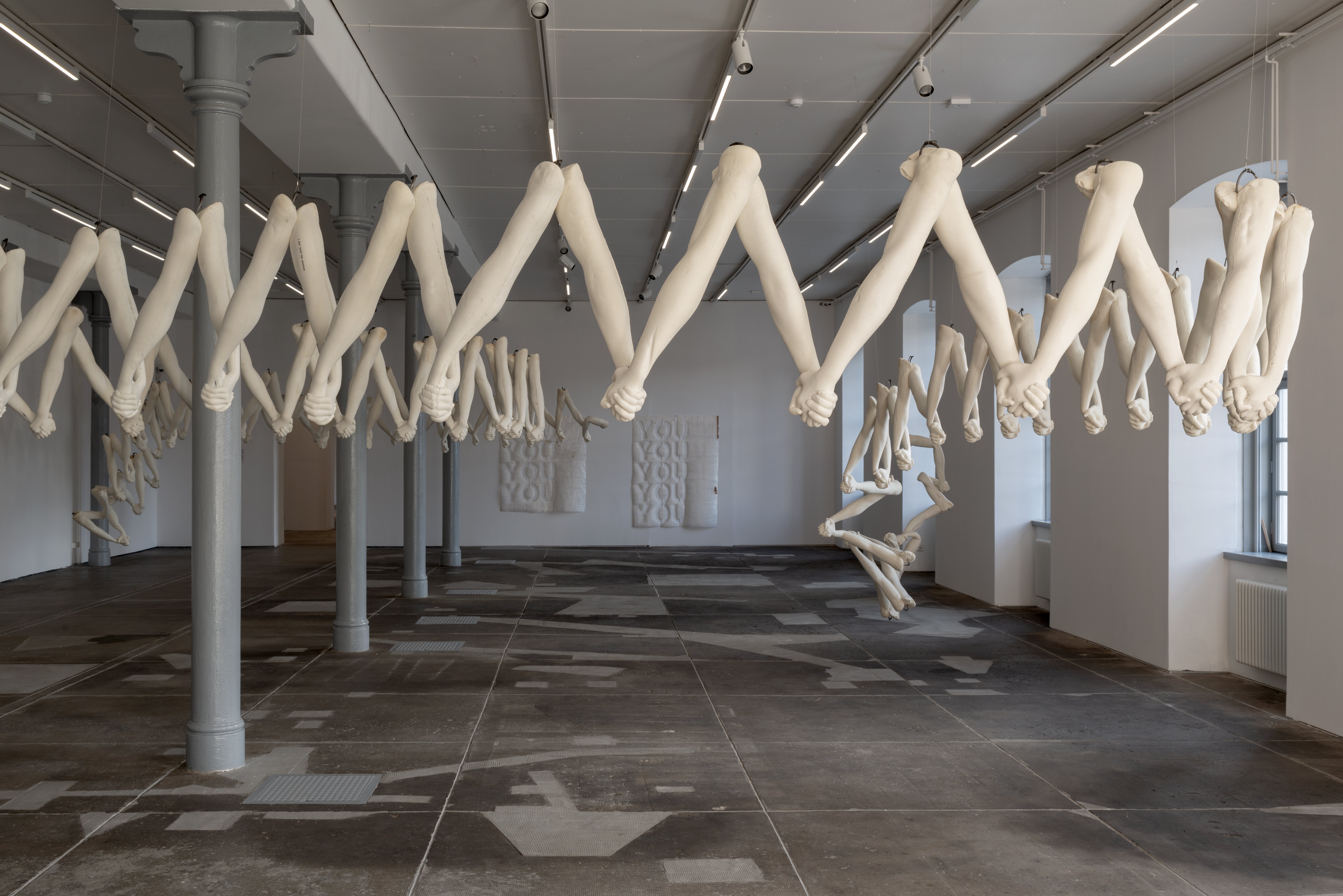Nikola Ukić: Make a Wish
16.3.–21.5.2023.
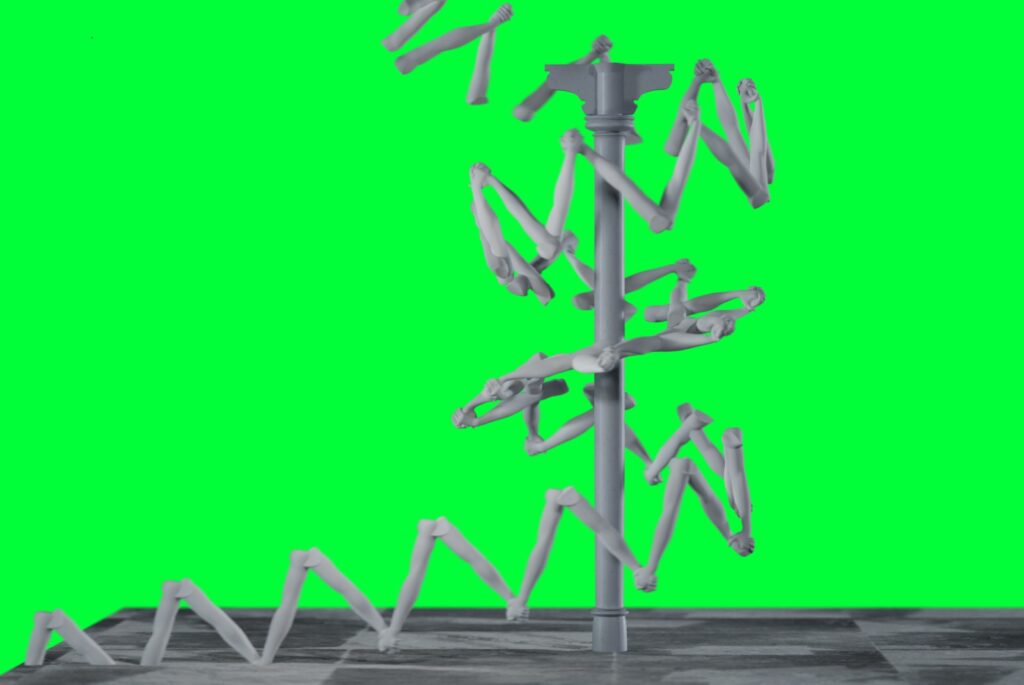
The Museum of Modern and Contemporary Art is opening Nikola Ukić’s solo exhibition on Thursday, 16 March, at 19:00. Under the title Make a Wish we continue to present artists from Rijeka’s art scene who came of age in the nineties and found more stimulating working conditions abroad. After graduating from the Academy of Fine Arts in Zagreb, Ukić attended the Academy in Düsseldorf (2000-2004), where he remained, with occasional activities on the local scene, primarily in Zagreb, Split and Rijeka.
The current exhibition features new large-scale works of demanding production, developed in dialogue with space and indirectly pointing to the building’s history and its repurposing from industrial use to a museum. In addition to smaller-scale wall art, the exhibition is based on objects between sculptural pieces and architecture, with an interest in the research of materials as a significant starting point, yet with new preoccupations and focal points. Whilst before he regarded matter as an independent component of his work, partly tamed in a random form it provides, now it immerses us into a physical experience of space where the visitor’s body becomes an important component. The exhibition itself takes the form of a stage and a visitor takes part with their own presence, in a dilemma before Ukić’s ambiguous objects which belong to the world of both everyday life and fiction, to both the familiar and the abhorrent (Make a Wish!).
The concrete and plastic configurations stimulate a diversion of the customary sculptural tradition oriented towards totality and noble materials, a largely idealised, full-fledged (figurative) representation and a vertical transposition of the material. Using the material differently from its original use, Ukić changes the usability of everyday objects and calls for their redefinition. By choosing industrial materials which act unpredictably and require a balance between control and surrender, the author alternates in the role of a maker and a passive observer. Ukić focuses on the questions of what sculpture can be today and how it is connected with social and manufacturing relations (Make a Wish!).
Witnessing the breakup of welfare state in which physically unfinished constructions become a mirror of reality, Ukić turns his gaze towards the future. In this context, Fugue (First Slab) becomes a metaphor of late capitalism dominated by the architecture of a non-place (1)– begun but unfinished building, abandoned concrete plants we mostly find around city outskirts. Unlike anthropologically defined places, non-places are considered the places of passing through, of not lingering or residing, where senseful communication lacks, just like a clear vision of the future. Playing with the idea of alienation which is an important trait of a non-place, Ukić raises awareness about the status of a space we build by means of everyday socialisation. Make a wish: a place as a synonym of home, where the body feels welcome or a non-place where bodies are random by-passers.
The exhibited works communicate by immediate materiality: coarse processing and texture of either hands, or building work in an initial stage of construction, or deflated pipes. They evoke ambiguous feelings: on the one hand the knowledge that we are waiting in the line of symbolical decay, and on the other hope that common sense will nevertheless save us, in line with our inoculated idea of progress which has not completely disappeared. This unstable space of ecological and economic-political (im)possibilities indicates a point where we have, to a certain extent, overcome the disappointment of defeats, but not the pointlessness of new alternatives.
The largest sculpture takes the shape of connected hands, under the name Circle Dance. Cast in life-size and multiplied, the hands are devoid of the body carrying them. They are suspended from the ceiling and set in an archaic form resembling a circle dance, stretching out towards and holding onto one another. The hands are visibly unalive, but they strike as alive; they are fragmentary, but they evoke corporeal unity and like phantom limbs they signify the memory of totality and longing for a return of the lost. Circle Dance doesn’t transmit the idea of a utopia or nostalgia, but rather opens up questions about the possibilities of a better reality, they way it should look and if this is a project we should carry out together, since no one is currently offering a vision of the future (Make a Wish!).
In terms of media, Ukić’s staging could be called sculpture in an expanded field which humorously expresses daily preoccupations, from the crisis of a coherent physical experience, the confusing dichotomy between reality and fiction, to the dilemma of common interests and relations of mutuality. He plays with recognizable iconography and advocates for alternative methods of structuring the visible. Using industrial and synthetic materials, Ukić designates the environment of fast growth and decay, which bequeaths depleted places and rejected plans. He contests non-places as equal substitutes to a place, which are in a society of profit sold as normal human habitat, developed due to uncontrolled urbanity and negligence to public space as a platform of socialization. This is favored also by the networked society which turns physical space into places of consumption and underfeeds its capacities for sociality, reducing communication to super-evolved digital infrastructures. Two opposing world views, one based on the economy of profit and the other on the productive energy of community led by the principle of pleasure, beyond particular interests, become a seesaw for an exchange of Ukić’s deliberations.
[1] Marc Augé, Non-Places: Introduction to an Anthropology of Supermodernity, Verso, London-New York, 1995.
Curators: Ksenija Orelj, Sabina Salamon
Partners: Gradske galerije Osijek, Galerija Waldinger
Nikola Ukić (Rijeka, 1974) started his artistic training in Rijeka at the former Faculty of Philosophy, Department of Visual Arts (1993-95). He continued at the Academy of Fine Arts in Zagreb from 1995 to 1999, and the Art Academy in Düsseldorf, graduating under professor Georg Herold. He has been living in Düsseldorf for over 20 years.
Ukić’s work ranges from ephemeral installations and site-specific sculptures to digital prints, videos and performances. His art practice focuses on challenging sculptural strategies, re-examining traditional givens and modernist protocols. He focuses on interactions between authenticity and fiction, the essential and the marginal, and focuses on the issues of cultural translation. Ukić continuously subjects sculptural processes to different contaminations, either by including other media on the top layer of his sculptures, or by selecting a sculpting process in which he accentuates the process-oriented nature of sculpture, challenging the obviousness of the artistic gesture and the self-sufficiency of sculpture.
Nikola Ukić has taken part in many exhibitions and has won several scholarships and residencies. For a longer period he has taught at art schools and he is currently a research associate at the Faculty of Architecture, University of Siegen, Germany. He co-curated the NRW artists exhibition at the Museum of Contemporary Art in Zagreb in 2014.
Exhibitions (selection): Schweben, Hengesbach Gallery, 2019, Form follows, PAEC Freiburg, 2015, Blow Up, Schloss Borbeck, Essen, 2015, Projective Cast, MCA Zagreb, 2013. Grants and awards: Neustart Kultur 2020, Kunstfond Foundation 2017, Young Talents Award NRW Art Foundation 2014, New Talents Art Cologne 2007, grant of the Art Academy and North Rhein-Westphalia State, Cité Paris 2002.
Sponsors: 3.t. cable, Opatija; Alsim j.d.o.o. Rijeka; Plast-a, Šapjane; Met-al, Trviž; Apsolut Hi-Fi, Rijeka; Damir Čargonja Čarli
Photo: Hrvoje Franjić
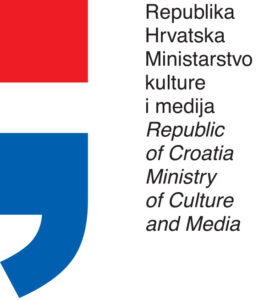
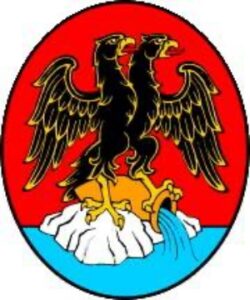
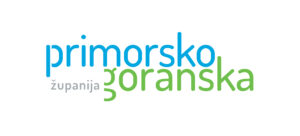
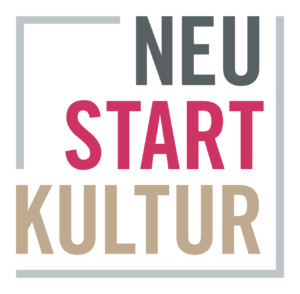
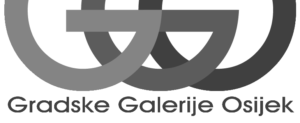
The opening of the exhibition will be on Thursday, March 16 at 7 pm.
Gallery
